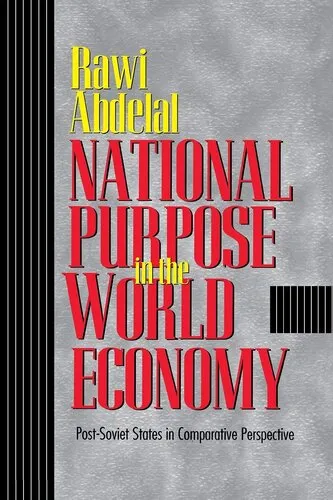National Purpose in the World Economy: Post-Soviet States in Comparative Perspective (Cornell Studies in Political Economy)
3.5
Reviews from our users

You Can Ask your questions from this book's AI after Login
Each download or ask from book AI costs 2 points. To earn more free points, please visit the Points Guide Page and complete some valuable actions.Introduction to "National Purpose in the World Economy: Post-Soviet States in Comparative Perspective"
Welcome to an exploration of the complex fabric that intertwines national identity and economic integration in the post-Soviet states. "National Purpose in the World Economy: Post-Soviet States in Comparative Perspective" delves into the myriad ways in which national purposes have shaped the outcomes of economic transformations in the countries once defined by their association with the Soviet Union. This book, part of the esteemed Cornell Studies in Political Economy, offers a rich analysis for scholars, policymakers, and anyone interested in understanding the dynamic interplay between national aspirations and global economic forces.
Detailed Summary of the Book
The dissolution of the Soviet Union marked a pivotal moment in global history, leading to the emergence of newly independent states, each with its own path to navigating the world economy. The book posits that national purpose is a critical lens through which these paths can be understood. By examining the unique trajectories of post-Soviet states, the book reveals how varying national identities and political motivations have influenced economic structures and policies.
Through comparative analysis, the book highlights how some states embraced capitalism wholeheartedly while others grappled with their socialist legacies. This variance in economic strategies is closely tied to how each nation perceived its place in the global economy and its historical context. The book is structured to provide a nuanced understanding of the economic dichotomies within these nations, influenced by both internal and external pressures.
Key Takeaways
- The notion of national purpose is crucial in understanding economic policy adjustments in post-Soviet states.
- Each state's path was uniquely influenced by its historical context, cultural identity, and political goals.
- Diverse outcomes in economic reforms highlight the variability in how these nations integrated into the global economy.
- Understanding the intersection of national identity and economic policy is vital for comprehending broader global economic patterns.
Famous Quotes from the Book
"National identity acts as both a compass and a map for states navigating economic upheaval."
"The legacy of the Soviet Union lives on in fragmented forms, guiding the economic destinies of its former constituents."
Why This Book Matters
In a world that continually shifts toward greater economic integration, understanding the diverse outcomes of post-Soviet states offers lessons on the importance of national narrative and identity in shaping economic policy. This book provides a compelling argument that even in the realm of globalization, the narratives that nations tell themselves remain powerful determinants of their economic paths. Given the ongoing global economic challenges and questions regarding national sovereignty, the relevance of such insights cannot be overstated.
Furthermore, this book appeals not only to scholars and students of political economy but also to practitioners and policymakers striving to understand the complex interdependence of national and global economies. Its profound analysis and insights serve as a guide for comprehending the broader implications of national economic strategies in the post-Soviet region and beyond.
Free Direct Download
You Can Download this book after Login
Accessing books through legal platforms and public libraries not only supports the rights of authors and publishers but also contributes to the sustainability of reading culture. Before downloading, please take a moment to consider these options.
Find this book on other platforms:
WorldCat helps you find books in libraries worldwide.
See ratings, reviews, and discussions on Goodreads.
Find and buy rare or used books on AbeBooks.
1249
بازدید3.5
امتیاز50
نظر98%
رضایتReviews:
3.5
Based on 0 users review
"کیفیت چاپ عالی بود، خیلی راضیام"
Questions & Answers
Ask questions about this book or help others by answering
No questions yet. Be the first to ask!


